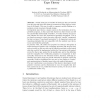128 search results - page 22 / 26 » Data-driven Induction of Functional Programs |
109
click to vote
EUSFLAT
2007
15 years 3 months ago
2007
In many regression learning algorithms for fuzzy rule bases it is not possible to define the error measure to be optimized freely. A possible alternative is the usage of global o...
222
click to vote
POPL
2006
ACM
16 years 2 months ago
2006
ACM
Functional programmers often reason about programs as if they were written in a total language, expecting the results to carry over to non-total (partial) languages. We justify su...
113
click to vote
POPL
2010
ACM
15 years 11 months ago
2010
ACM
This paper introduces a new recursion principle for inductive data modulo -equivalence of bound names. It makes use of Oderskystyle local names when recursing over bound names. It...
LCPC
2001
Springer
15 years 6 months ago
2001
Springer
Integer division, modulo, and remainder operations are expressive and useful operations. They are logical candidates to express complex data accesses such as the wrap-around behav...
145
Voted
CIE
2008
Springer
15 years 4 months ago
2008
Springer
Nested datatypes are families of datatypes that are indexed over all types and where the datatype constructors relate different members of the family. This may be used to represent...

